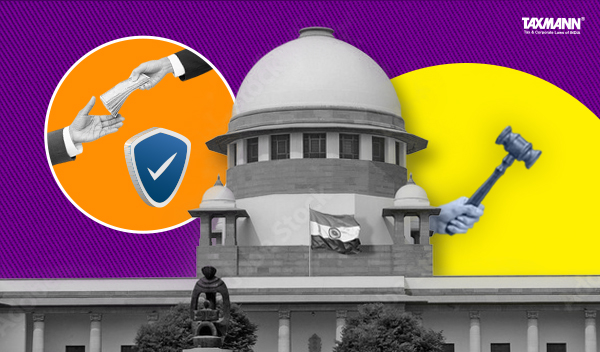Appellant-Bank Was Classified as a FC, as Hypothecation Deed Served as a Guarantee for Borrowers’ Liability | SC
- News|Blog|Insolvency and Bankruptcy Code|
- 3 Min Read
- By Taxmann
- |
- Last Updated on 26 December, 2024

Case Details: China Development Bank v. Doha Bank Q.P.S.C. - [2024] 169 taxmann.com 526 (SC)
Judiciary and Counsel Details
- Abhay S. Oka & Pankaj Mithal, JJ.
Facts of the Case
In the instant case, the Appellant bank had extended financial facilities to borrowers RCom and RTL). In order to secure repayment of the said facilities, RCom entities (corporate debtor, RCom and RTL) had executed a deed of hypothecation (DoH) in favour of the appellant bank.
The CIRP was initiated against the corporate debtor. The Appellant bank submitted its claim as a financial creditor of the corporate debtor, and the same was admitted by the RP. The Respondent-secured financial creditor of the corporate debtor, had filed an application before the NCLT, alleging that the appellants were not direct lenders of corporate debtor, and it was impermissible to admit them as financial creditors on basis of DoH.
The NCLT vide order held that the decision of RP to classify indirect lenders as financial creditors of the corporate debtor was correct. The NCLAT vide the impugned order had set aside the NCLT’s order on the ground that deeds of hypothecation were not a deed of guarantee and a mere security interest created by hypothecation or mortgage would not constitute a financial debt.
It was noted that the right to payment can be legal, equitable, secured, or unsecured. Therefore, if there is a liability or obligation in respect of a disputed payment, it still becomes a claim. Once there is a liability or obligation in respect of a claim, it becomes a debt. Once there is a financial debt, the person to whom a debt is owed becomes a financial creditor.
Supreme Court Held
The Supreme Court observed that the amount of any liability with respect to any guarantee of money borrowed against payment of interest constitutes financial debt under section 5(8) of the IBC. Further, under a deed of hypothecation, the corporate debtor had undertaken to discharge the liability of third parties (RCom and RTL) and, therefore, DoH had amounted to a guarantee provided by the corporate debtor to the appellants in terms of section 126 of the Indian Contract Act.
The Supreme Court held that since there was no requirement incorporated in section 5(8) that debt becomes financial debt only when default occurs, the appellants would be classified as financial creditors of the corporate debtor. Thus, NCLAT was not justified in holding that the appellant bank was not a financial creditor and, therefore, the impugned order passed by the NCLAT was to be set aside.
List of Cases Reviewed
- Doha Bank Q.P.S.C v. Anish Nanavaty, Resolution Professional of Corporate Debtor Deloitte Touche Tohmatsu India LLP [2022] 144 taxmann.com 75 (NCLAT-New Delhi) (para 68) reversed.
List of Cases Referred to
- Kotak Mahindra Bank Limited v. A. Balakrishnan (2022) 9 SCC 186 (para 16)
- Orator Marketing Pvt. Ltd. v. Samtex Desinz Pvt. Ltd. (2023) 3 SCC 753 (para 16)
- Maitreya Doshi v. Anand Rathi Global Finance Ltd. & Ors AIR 2022 SC 4595 (para 16)
- M.C. Chacko v. State Bank of Travancore (1969) 2 SCC 343 (para 16)
- Essar Steel Ltd. v. Gramercy Emerging Market Fund 2002 SCC OnLine Guj 319 (para 16)
- Vistra ITCL (India) Ltd. & Ors. v. Dinkar Venkatasubramanian (2023) 7 SCC 324 (para 18)
- B.K. Muniraju v. State of Karnataka & Ors. (2008) 4 SCC 451 (para 20)
- Union of India v. D.N. Revri & Co. and Ors. (1976) 4 SCC 147 (para 20)
- Maharashtra State Electricity Distribution Company Limited v. Maharashtra Electricity Regulatory Commission & Ors. (2022) 4 SCC 657 (para 20)
- Committee of Creditors of Essar Steel India Limited. v. Satish Kumar Gupta & Ors (2020) 8 SCC 531 (para 21)
- Phoenix ARC Pvt. Ltd. v. Ketulbhai Ramubhai Patel (2021) 2 SCC 799 (para 26)
- Western Coalfields Limited & Anr. v. Rajesh s/o Nandlal Biyani 2011 SCC OnLine Bom 1217 (para 28)
- Anuj Jain, Interim Resolution Professional for Jaypee Infratech Limited v. Axis Bank Limited & Ors (2020) 8 SCC 401 (para 31)
- C.C., C.E. and S.T. Bangalore (Adjudication) & Ors. v. Northern Operating Systems Pvt. Ltd. AIR 2022 SC 2450/2022 INSC 598 (para 53).
Disclaimer: The content/information published on the website is only for general information of the user and shall not be construed as legal advice. While the Taxmann has exercised reasonable efforts to ensure the veracity of information/content published, Taxmann shall be under no liability in any manner whatsoever for incorrect information, if any.

Taxmann Publications has a dedicated in-house Research & Editorial Team. This team consists of a team of Chartered Accountants, Company Secretaries, and Lawyers. This team works under the guidance and supervision of editor-in-chief Mr Rakesh Bhargava.
The Research and Editorial Team is responsible for developing reliable and accurate content for the readers. The team follows the six-sigma approach to achieve the benchmark of zero error in its publications and research platforms. The team ensures that the following publication guidelines are thoroughly followed while developing the content:
- The statutory material is obtained only from the authorized and reliable sources
- All the latest developments in the judicial and legislative fields are covered
- Prepare the analytical write-ups on current, controversial, and important issues to help the readers to understand the concept and its implications
- Every content published by Taxmann is complete, accurate and lucid
- All evidence-based statements are supported with proper reference to Section, Circular No., Notification No. or citations
- The golden rules of grammar, style and consistency are thoroughly followed
- Font and size that’s easy to read and remain consistent across all imprint and digital publications are applied



 CA | CS | CMA
CA | CS | CMA
